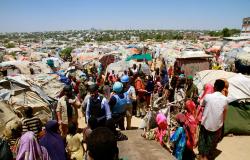
Displacement is urbanizing. Urban violence increasingly contributes to displacement while a growing number of displaced people across the globe seeks refuge in cities. This article builds on original research in four Somali cities to explore the link between violence, displacement and urbanization. It identifies and comparatively explores three types of urban settlements of displaced people: urban camps at cities’ outskirts, inner‐city squatter settlements, and relocation areas. The focus of the analysis is on the political economy that underpins the establishment, maintenance and, at times, destruction of these settlements. The article shows that settlements of displaced people are embedded in varied practices of rent seeking which contribute to the commercialization of land and housing and lead to further land speculations. Urban reconstruction accelerates rent seeking and goes hand in hand with (mass‐scale) evictions of displaced people. The article also shows how land ownership is mobilized to retain political rights and citizenship. The findings outline the multiple ways urban land relations are intertwined with practices of sovereignty and citizenship, and attest to observations of a globally expanding rent economy. They also underscore the arbitrariness and violence imbricated in property relations.
Policy Implications
- Displacement is urbanising and increasingly development‐induced, for example, caused by economic development and urban reconstruction. International approaches to mitigate causes and effects of displacement need to take account of effects of urban reconstruction and secondary displacements.
- Prioritize statebuilding and urban reconstruction initiatives, including reestablishment of infrastructures, that include measures to increase safety of displaced people and urban poor, including protection from evictions.
- Measures to ensure more inclusive urban development and land management should be developed in Somali cities. This requires to identify micro‐political practices that emerge in settlements of displaced people and to acknowledge the role aid plays in structuring unequal relations and power dynamics.
- Approaches aimed at providing ‘durable solutions’ should aim at increasing locational security of displaced people, negotiate mechanism for protection with political authorities, landowners and gatekeepers.
Image: Utenriksdepartementet UD via Flickr (CC BY-ND 2.0)